|
|
|
Sort Order |
|
|
|
Items / Page
|
|
|
|
|
|
|
| Srl | Item |
| 1 |
ID:
091487


|
|
|
|
|
| Publication |
2009.
|
| Summary/Abstract |
This article examines the ways and means in which states employ irregular and indigenous personnel in a counter-insurgency (COIN) or counter-terrorist (CT) campaign, in the historical and contemporary context. The authors clarify the terminology surrounding this neglected area of COIN/CT theory, and identify four types of indigenous assistance - individual actors (trackers, interpreters, informers and agents); home guards and militias; counter-gangs; and pseudo-gangs. This article concludes that while the use of such indigenous irregulars has its advantages for the state and its armed/security forces (particularly as far as intelligence, local knowledge and undermining the insurgent's cause is concerned), it can also have serious practical and ethical implications for a COIN/CT campaign, and can have unexpected and unwelcome consequences including violations of laws of armed conflict, the undermining of governmental authority and the prospects of endemic internal strife and state collapse.
|
|
|
|
|
|
|
|
|
|
|
|
|
|
|
|
| 2 |
ID:
173966
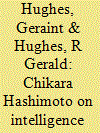

|
|
|
|
|
| Summary/Abstract |
‘We cannot allow [Nasser], who has neither the authority of a throne nor of a parliament to destroy our base and threaten our rear’ Harold Macmillan, diary entry for 23 September 1955
|
|
|
|
|
|
|
|
|
|
|
|
|
|
|
|
| 3 |
ID:
102960
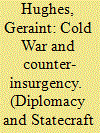

|
|
|
|
|
| Publication |
2011.
|
| Summary/Abstract |
Due to the American-led interventions in Afghanistan and Iraq, theories surrounding counter-insurgency, or COIN, have aroused intense debate in political, military, and academic circles in the United States, Britain, and other Western countries. This article shows that current thinking about how to fight and defeat insurgent movements is based primarily on Cold War-era theories and conflicts. It traces the evolution in COIN thinking both before and during the Cold War-incorporating Western and Eastern bloc experiences of war against insurgents from Malaya to Afghanistan-but also illustrates the conceptual difficulties of applying doctrines based on the historical record of this era. The article concludes by arguing that theories derived from the experiences of states involved in COIN campaigns from 1945 to 1991 still retain utility, but that there are significant differences between Cold War insurgencies and current conflicts associated with the "war on terror"/"long war" which affect the applicability of doctrines based on historical analysis and the works of Thompson, Kitson, Galula, and other "classic" theorists.
|
|
|
|
|
|
|
|
|
|
|
|
|
|
|
|
| 4 |
ID:
138443
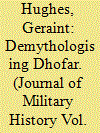

|
|
|
|
|
| Summary/Abstract |
This article re-examines the civil war (1963–1976) between the Sultanate of Oman and the Popular Front for the Liberation of Oman (PFLO), particularly the U.K.’s support of the government. Using archival evidence and private papers, it argues that the counter-insurgency (COIN) campaign’s image as “population-centric” is flawed, and that the British and Omani governments relied more on military measures against the PFLO to recapture Dhofar province than on the “hearts and minds” and civil development programmes emphasised in traditional accounts. It counsels against using Dhofar as a possible example of indirect military assistance in contemporary COIN, arguing that the conflict’s specific historical characteristics may not be replicated now or in the immediate future.
|
|
|
|
|
|
|
|
|
|
|
|
|
|
|
|
| 5 |
ID:
190716
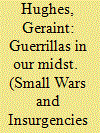

|
|
|
|
|
| Summary/Abstract |
Over the past two decades the historical record of Britain’s wars against a series of insurgencies has experienced a fundamental academic re-assessment, challenging established beliefs about how the British state and its institutions – in particular the British Army – have waged counterinsurgency, and questioning traditional presumptions that Britain fought its insurgent enemies according to a doctrine guided by ‘hearts and minds’ and ‘minimum force’. This article shows that hints about the murky reality behind the ‘British way in counterinsurgency’ can be seen in novels published during the post-war era, some of which used recent conflicts as their subject matter, others of which referred tangentially to previous wars. Not only were these best-selling books with an international audience, but these authors had experience with Britain’s armed forces and intelligence services, and were either directly involved in counterinsurgency conflicts, or their works indicated insight and knowledge about them. Their books provided fictional illustrations of many of the themes – coercive tactics against civilians, special operations against insurgents, inter-departmental disputes, the lack of cultural understanding, the maltreatment of detainees and the excessive use of force against suspected insurgents and civilians – that have been identified and examined by military historians and other academic specialists covering Britain and counterinsurgency.
|
|
|
|
|
|
|
|
|
|
|
|
|
|
|
|
| 6 |
ID:
096513
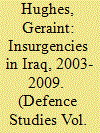

|
|
|
| 7 |
ID:
122186


|
|
|
|
|
| Publication |
2012.
|
| Summary/Abstract |
As the tenth anniversary of the US-UK invasion of Iraq approaches, and with the findings of the Chilcot Inquiry yet to be published, public debate is likely to focus once again on the events surrounding the political decision to go to war. However, many argue that this will overshadow the most important lessons for the UK: those that can be drawn from the conduct of military operations in southeastern Iraq, in the period between 2003 and 2007. Geraint Hughes offers a timely reminder why Operation Telic must not be forgotten, surveying the British experience of the conflict in Iraq at the political, strategic and military levels.
|
|
|
|
|
|
|
|
|
|
|
|
|
|
|
|
| 8 |
ID:
144338
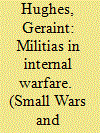

|
|
|
|
|
| Summary/Abstract |
Although it is a tenet of political science that the modern state possesses a ‘monopoly of violence’, governments have repeatedly used militias outside the formal chain of command of their armed forces when waging counterinsurgency (COIN), and in recent conflicts the USA, UK, and other Western powers have used irregular forces when fighting insurgencies in Iraq and Afghanistan. War-weariness and financial austerity is likely to encourage American and allied policymakers to rely on auxiliaries as proxies, despite the fact that historical experience demonstrates that the use of militias in COIN can have counterproductive consequences, not least for state stability. This article also concludes that the tendency of some Middle Eastern states (notably Iraq and Syria) to ‘coup-proof’ their militaries renders them even more dependent on militias in the face of a sustained internal revolt, as their regular armed forces collapse under the stress of combat. In this respect, there is a direct link between ‘coup-proofing’, dependence on irregular auxiliaries in civil war, and the erosion of the state’s integrity.
|
|
|
|
|
|
|
|
|
|
|
|
|
|
|
|
| 9 |
ID:
087824
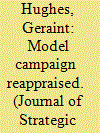

|
|
|
|
|
| Publication |
2009.
|
| Summary/Abstract |
This article examines the Dhofar campaign in Oman (1965-75), and the role Britain played in assisting the Omani royal government against left-wing insurgents. Using existing secondary sources and declassified British government papers, it reassesses the contribution of British military advisers and special forces to the counter-insurgency (COIN) campaign, the balance between military action and civil affairs, the external dimension of the conflict, and intelligence and covert operations. It concludes by assessing whether the Dhofar War offers any guidance to Western armed forces involved in contemporary COIN campaigns such as those in Afghanistan and Iraq.
|
|
|
|
|
|
|
|
|
|
|
|
|
|
|
|
| 10 |
ID:
071968
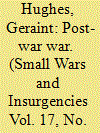

|
|
|
|
|
| Publication |
2006.
|
| Summary/Abstract |
This article examines the history of Operation Masterdom, the occupation of Southern-Indochina by British-Indian forces commanded by Major-General Douglas Gracey during the autumn and winter of 1945-46. It summarises the factors which led to the occupation force's embroilment in the struggle between the French and the Viet Minh, and compares and contrasts Masterdom with the present political and strategic problems faced by the US-led coalition in Iraq.
|
|
|
|
|
|
|
|
|
|
|
|
|
|
|
|
| 11 |
ID:
136430
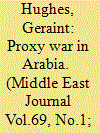

|
|
|
|
|
| Summary/Abstract |
This article examines a hitherto obscure aspect of the conflict in Dhofar, Oman (1963–76), the Anglo-Omani covert operation (Operation Dhib) to send Mahra tribesmen to conduct cross-border raids into South Yemen during the early 1970s. Using declassified British government papers, this article outlines the origins of Operation Dhib, and the contrasting objectives of the Sultanate of Oman and the United Kingdom in instigating and sponsoring this covert action.
|
|
|
|
|
|
|
|
|
|
|
|
|
|
|
|
| 12 |
ID:
134482
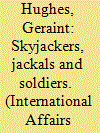

|
|
|
|
|
| Summary/Abstract |
Following the Munich Olympics massacre of September 1972, the British government conducted a series of contingency plans to ensure that Whitehall, police constabularies and the armed forces were prepared for similar crises affecting the UK and its citizens. This article examines the evolution of British counterterrorist planning during the 1970s, which still shapes Whitehall's crisis management procedures for responding to international terrorism, and also procedures for calling for military support in response to hijackings, hostage-taking and similar incidents both domestically and overseas. It demonstrates that while there are differences in the character of the terrorist threat 40 years ago and today, there are also parallels between the practical and political challenges of counterterrorism in the era of the Baader–Meinhof group and Carlos the Jackal, and the struggle against al-Qaeda and its affiliates today.
|
|
|
|
|
|
|
|
|
|
|
|
|
|
|
|
| 13 |
ID:
083204
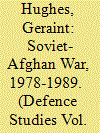

|
|
|
|
|
| Publication |
2008.
|
| Summary/Abstract |
The British military deployment to Sierra Leone in May 2000 marked therenewal of a long historical connection between the two countries. As aformer British colony, from 1829-1961 the authorities in London wereresponsible for providing the administration and governance of their West African territory as well as safe-guarding its security. This entailed thecreation of a dedicated local military structure, mixing local troops withseconded British officers to guard the frontiers of the small country againstboth external and internal threats. Although in a much revised form, thismission appears to have been now once again renewed.
|
|
|
|
|
|
|
|
|
|
|
|
|
|
|
|
| 14 |
ID:
101334


|
|
|
|
|
| Publication |
2010.
|
| Summary/Abstract |
This article examines the use of specialised plain-clothes military units in counter-terrorism, concentrating on examples involving liberal-democratic states. It analyses the benefits and problems arising from clandestine military activity, focusing in particular on British army units (notably 14 Intelligence Company and the Force Research Unit in Northern Ireland). The article concludes by arguing that such formations have a clear utility - notably in gathering intelligence on terrorist groups - but other aspects of their role are inherently controversial (notably in cases where undercover soldiers use deadly force against suspected terrorists). It also states that plain-clothes military operations need to be conducted on the basis of accountability, both for strategic reasons, and also in accordance with the norms of liberal democracy.
|
|
|
|
|
|
|
|
|
|
|
|
|
|
|
|
| 15 |
ID:
176520
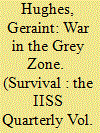

|
|
|
|
|
| Summary/Abstract |
Democratic powers like the US and the UK have extensive experience of operating within the grey zone, and states that practise grey-zone warfare can be countered.
|
|
|
|
|
|
|
|
|
|
|
|
|
|
|
|
|
|
|
|
|